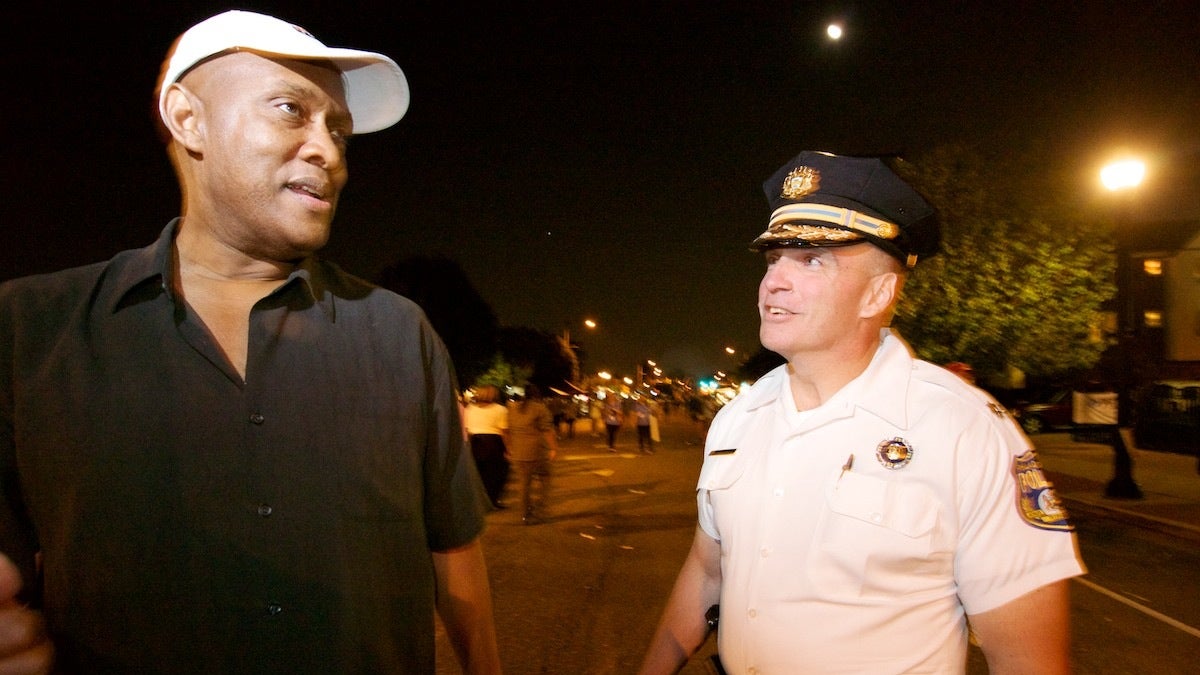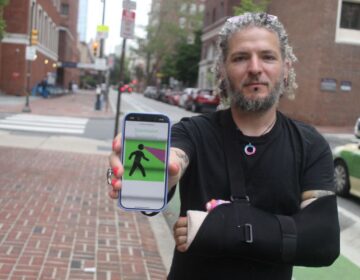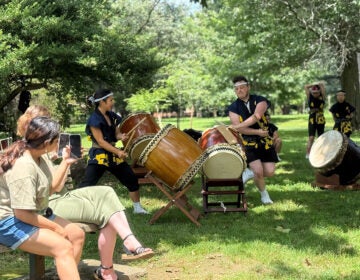State Rep. Dwight Evans discusses highs and lows of more than 30 years in office

State Rep. Dwight Evans and Police Inspector James Kelly walk along Ogontz Avenue at the West Oak Lane Night Market in June. (Bas Slabbers/for NewsWorks, file)
It’s been more than three decades since state Rep. Dwight Evans started batting for Philadelphia in Harrisburg. He’s developed quite a reputation over the years — for better and for worse. Depending on whom you talk to, Evans is either a civic hero or a run-of-the-mill career pol.
He’s arguably done much good for West Oak Lane, the epicenter of his district, and, some would say, for Philadelphia as a whole. But some are less than fond of the political tactics he’s used to get things done, including his use of “WAMs” or walking-around money.
Evans, for his part, stands by his approach to being a lawmaker, which is laid out in some detail in his new book “Making Ideas Matter: My Life as a Policy Entrepreneur.”
NewsWorks recently caught up with Evans at his West Oak Lane campaign office to talk about the release and the political philosophy he’s carried with him all this time.
“You don’t have to agree or believe what I have said, but from my perspective, out of my head, these are the things that I see,” said Evans of the impetus behind the book.
Q&A
NewsWorks: Why did you want to write this book now?
Dwight Evans: I thought it would be important for people to kind of understand what has motivated me over the years. And, obviously, what motivates me a great deal is that it starts with an idea and that ideas are what drive our whole political process and everything else. And I sometimes think we forget about that. I think we talk about things like how much money you raised, what are your polling numbers, and who’s for you. But at the basis of it all is an idea. And it’s an idea that generally, in my view, motivates to make a connection to why people think they should vote for you. Barack Obama is an example of that and that’s hope and change, the healthcare, right. Bill Clinton, George Bush, you name it. Now, they all come from different perspectives, but it starts with an idea.
And that’s why we entitled the book “Making Ideas Matter,” because I think that my entire career has always been trying to find ways to make ideas relevant to people so that they then make the connection of why it is important to be involved in this democracy, in this citizenship. You know, it’s larger than just politics. Politics is a mechanism to get elected, but the basis of it is it’s a democracy; it’s participatory, citizenship — all those elements. And I think, why now, is because I think people have gotten away from that and I have, if not more enthusiasm than when I started 35 years ago. And I thought that would be good coming from a long-time elected official, which most people think you get kind of cynical, kind of stale about things. If anything I have more passion and more drive about the element of ideas and the debate about the change of things.
NW: Was there a specific moment when you knew you wanted to get into politics?
DE: I don’t know if it was a specific moment, but I think it was the time and the age that I sort of grew up in. During that time, it was the 60s. Dr. Martin Luther King, Malcolm X, Leon Sullivan, Whitney Young, all of those elements going on at that time, civil rights movement, voting rights, Lyndon Johnson. The first campaign that I was involved was a guy by the name of Bill Ewing, who was head of the East Mt. Airy Association. And being involved in that campaign, I saw it as an extension of my citizen participation. I was a block captain organizing blocks. So it was taking the elements of organizing the block to the level of public policy. That’s what it was. I mean I was hands-on being a community activist and organizing, but then I wanted to take it to a macro level and the only way to take it to a macro level was to run for public office and to argue my case on ideas in the legislature about things that I thought needed to be different.
NW: Tenacity seems to be the central characteristic of your political career. How big a role has it played?
DE: I think that is probably two things. One, that’s the drive, but also, if you see something wrong, let’s correct it. If you see that something’s not right, let’s try to change it rather than just sit there. So there’s the drive, but there’s the element where if I see that there’s problems, we can figure out a way to do something about it. Not necessarily always through government. Government is just one aspect of it. But there are things that we can do as a community — cleaning your block, organizing your block, engaging with young people, conversations where you try to build a family structure.
NW: Do you think your tenacity has ever backfired on you?
DE: No, just the opposite. Sometimes I felt like I didn’t work hard enough. Sometimes when there were disappointments, I should have worked harder. That’s kind of what I did. Sometimes, when you’re not successful, I didn’t necessarily look at that was my problem. You know, it didn’t fall in place. You know, I didn’t get upset when I wasn’t successful in certain runs for public office. I didn’t just say I’m going to take my milk and cookies and go home. I just dug deeper and figured out another way that we could try to do some things. I didn’t say, ‘I didn’t become successful as mayor and governor that I’m just going to stop.’
NW: You helped launched the charter-school movement in Pennsylvania. You write in your book, that you thought charter schools could help improve public education overall in the state. Do you think it has?
DE: I think it’s still a work in progress. There are some great schools. There are some great schools. There some great charter schools and there’s some bad charter schools. It’s not like running McDonald’s. The McDonald’s that serves hamburgers here, if you go to Oklahoma, the hamburgers should be the same. That’s what they say, right?
I think [charters] have improved the discussion and the debate. I think it has forced either policy makers, people who run systems that this same constituency has other options and choices available to them. When you go to Central and Masterman, you have choices. Masterman is the number one school in the state and on Forbes Magazine it’s number 76. Central is number 10. How many people can go to Masterman and Central? I don’t think many people can go to Masterman and Central. I’m not making a judgment. I think they can only hold 2,500. That’s 5,000 kids. So what happens to the kids that can’t go there? What choice do they have?
NW: You spent two decades chairing the House Appropriations Committee. Was getting elected to that post the biggest moment of your political career?
DE: No. Probably the biggest thing was turning around Ogontz Avenue, West Oak Lane Charter School — those things were when the rubber meets the road, where ideas really did matter. Most people didn’t understand what it meant for me to be chairman. Most people didn’t understand. They didn’t have a clue. They didn’t know how to spell the word. They didn’t understand that. What’s that mean? They didn’t realize it until I was no longer there, until suddenly things had changed. Then they realized, ‘oh there’s something different going on. Dwight’s not there anymore.’ The biggest moments are what I did in this neighborhood. That’s where I started. It mean, it was there. It was a tool. Being chairman was a tool. That’s all it was. It was a tool that I understood how to use very effectively. I understood how to use that tool better than anyone had even envisioned.
NW: You said you were ready to move on from the chairmanship. Why?
DE: Politics is a contact sport. You stick in this stuff long enough and you’re going to get hit. Barack Obama lost to Bobby Rush, Bill Clinton got un-elected as governor, Ed Rendell lost to Wilson Goode, go down the list. Politics is a contact sport. Whenever you’re trying to do something, you’re going to get people upset. But 20 years? That’s longer than anyone has ever done it. I was 36 years old when I got elected. I was only in the legislature for 10 years. So I was the youngest, less seniority. I did it for 20 years and I was on the committee for eight years prior to being chairman. So that’s 28 budgets, meetings I sat through in February. It was time. That’s why I ran for governor. Tried to run for lieutenant governor, tried to run for mayor. I felt like the skill set that I had developed, that I was hoping people could see that I could use that skill set and use it in other ways. That’s kind of what I was hoping. I just didn’t make the connection.
NW: Are you considering any other runs for higher office?
DE: All I’m trying to do is sell books. All the profit goes to Feels Institute. I want to have a larger discussion on making ideas matter and that people can make a difference. I think I’m starting that, but it’s been a long process.
NW: What has been the proudest moment of your political life?
DE: Proudest would be the Fresh Food Financing Initiative in this book where it talks about something that is going national.
NW: What has been your greatest disappointment?
DE: Probably not being able to see through the Martin Luther King aspect of what I wanted to do. I was like a dog on a bone, I wanted to see it through to demonstrate to people that you could take an urban high school and make a change. I know you could do it, but unfortunately, that didn’t happen because when you read in the story, [Charter school operator] Foundations [Inc.] decided not to follow through. I don’t blame them, but I wanted to see it because that is extremely essential to all of it. So that, if anything, was a disappointment. It’s disappointing because of the kids. It’s disappointing because of the community. You had all of those conversations up there.
[MLK] could be so much better. Absolutely. No question. It’s named after Martin Luther King. Worldwide. Excellent. Absolutely it could be better. There is no question — that means the kids, the parents, the teachers, the community, we all have a responsibility.
NW: Why do you think the effort to have Foundations run King fell through?
DE: I think that there were individuals who are always constantly questioning the motives. They were more interested in what happened in that meeting. What was the intrigue of that meeting? I even showed the email of what Mosaica said when they decided to pull out, and it was like, ‘ Well that doesn’t mean anything. It was like — we’re not going to believe that. What are you going to believe? They said why they pulled out. What do you want me to say? ‘Well, you must have strong-armed them’ and then the mayor with the integrity officer, she writes her report and she says what she says in her report. I can only tell you what’s in my heart and head. That’s what I can tell you. You either believe it or you don’t believe it. Now, in spite of all of that, here were are in 2013, there’s not one single thing that’s been reported of anything that was improper. Not one thing.
Remember the idea. Not, sort of, the process because the process can supersede the idea. The point of it is, what I was attempting to do is to make this idea matter to the people who needed to be serviced. So here’s an idea connecting it to first and foremost the kids and the parents and the employees. The part about Foundations getting a 60 million dollar contract, they give me contributions, well one, contributions are not illegal last time I checked. They only have to be recorded. All that’s recorded. Contributions recorded, public record. That’s all recorded. So if my contributions are recorded, what else is the issue? Somebody is trying to suggest because somebody supports me that I support them that that’s why they support me? I didn’t say that in the book. You can speculate all you want.
NW: What has kept you motivated all of these years?
DE: Just wanting to see things different. To make a difference. It hasn’t happened as fast as I would like it to happen, but it’s happened. It’s a very slow, methodical process. Again, remember, you’re up against systems — school system, political system — these are old systems and you’re up against people’s culture and their values. I’m not saying my values are better than anybody’s. But the name of the game is to get something done and what happens is that you have one person that gets elected by one constituency. I get elected by another constituency and I don’t they understand the premise of the governing model that we have. The name of the game is to move forward and get something done. And that doesn’t mean you violate what your principals are.
I don’t profess to say I’ve been perfect. Have I made some mistakes? Probably made some mistakes. But at the end of the day, I’ve only tried to keep moving forward, include people, get people involved. Either people like me or they don’t like me. I can’t do anything about people not liking me or liking me. Sometimes I don’t agree with myself. But anyway, you keep moving.
WHYY is your source for fact-based, in-depth journalism and information. As a nonprofit organization, we rely on financial support from readers like you. Please give today.





